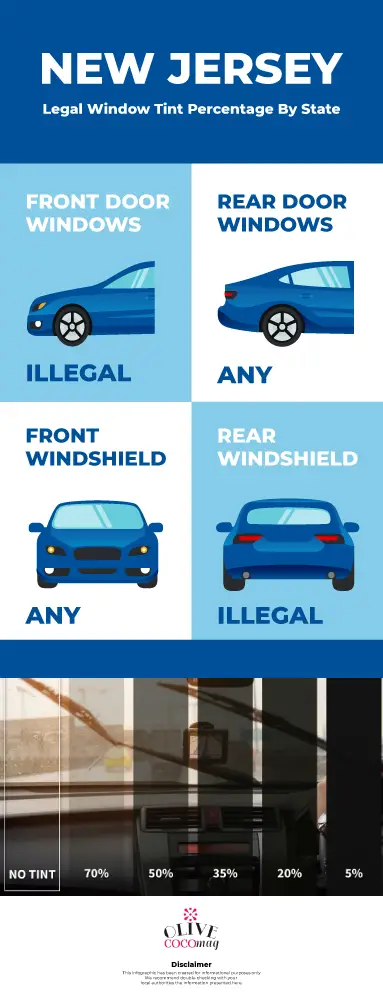The New Jersey window tinting laws were enacted in 2003. This state was the 40th to enforce laws on window tints out of all the states in the United States. There are various specifications for the darkness and reflectivity that are allowed on the vehicle windows. These restrictions are imposed for the safety of the passengers and pedestrians by ensuring the proper vision of the drivers. Therefore, you are encouraged to follow these rules and regulations not only to avoid getting fined but also to ensure the safety of yourself and others.
The darkness is specified by the amount of light allowed to transmit through the car windows. This is described as the Visible Light Transmission factor (VLT) and indicated in percentages. The higher this value is, the more the amount of light penetrating inside will be. Depending on this amount, there are various restrictions on passenger vehicles and multi-purpose vehicles. The following details give a clear idea about the legally allowed tint under the New Jersey window tinting law. For your information, the legal statements are also included.

Table of Contents
Window Tint Darkness as in New Jersey Window Tinting Law
Tint darkness for sedans, SUVs, and vans:
- Windshield: No tint is allowed on the windshield.
- Front Side windows: No tint can be applied legally to this window.
- Back Side windows: Any darkness can be applied.
- Rear Window: Any darkness can be applied.
Window Tint Reflection as in New Jersey Window Tinting Law
Tint reflection for sedans, SUVs, and vans:
- Front Side windows: No mirrored or metallic appearance.
- Back Side windows: No mirrored or metallic appearance.
Other New Jersey Window Tint Rules and Regulations:
The state of New Jersey has several other important laws. They are as follows:
- Side Mirrors
If the vehicle’s back window is tinted, then dual side mirrors are required
- Restricted Colors
No specific colors of tint are banned by the New Jersey window tinting law. All colors would be allowed. To learn about the shades, you can choose, refer to Window Tinting Shades Chart.
- Certificates and Stickers
It is not required to certify the film by manufacturers to sell in this state. Stickers are also not required to identify legal tints in New Jersey. Choose the best type of window tinting that you would like to install in your car from Types of Window Tint.
- Medical Exemptions
There some states where the laws are so strict and medical exemptions are not allowed. But New Jersey allows medical exemptions for special tint. The medical conditions related to this would include dermatological photosensitivity, chronic actinic dermatitis, photosensitive eczema, and skin cancers. To get the medical exemptions, a prescription from a licensed physicist or dermatologist should be provided. The medical exemption would allow darkness below 70% on the windshield and below 35% on the front windows.
This medical exemption certificate should be kept in the vehicle always. It would be valid for 48 months. After the required dark tint is installed in the vehicle, it should have a label including the name of the sunscreen material manufacturer, registration number of the installer. This label should be displayed on the windshield and the front right side window. When selling the vehicle, it is mandatory to remove this special tint and get legal tints in New Jersey.
- Penalties
For the first offense in violating the window tint law, a fine of a maximum of $1,000 will be charged, and $5,000 for second or subsequent offenses. Since this penalty is relatively high, you would like to avoid any trouble by simply choosing to abide by the laws. So, you can remove any illegal tint if you already have one on your car windows. To do this yourself, refer to the article on How to Remove Window Tint.
Since the state of New Jersey is highly populated and busy, you would have to get adapted to the tight schedules of your window tint installer. Therefore, you would want to do it yourself. We can help you with this through the article How to Tint your Car Windows.
For more details about the other states, refer to Window Tint Laws in the U.S. by State.
State of New Jersey Information
The state of New Jersey is located in the northeast and middle Atlantic regions of the United States. It is surrounded by New York from the north and east, with the Atlantic Ocean from the south and southeast. It also has Pennsylvania on the west and Delaware on the southwest. This is the fourth-smallest from the extension but the 11th most populous state. It is also the most densely populated out of all the states. According to the U.S. state by 2011 median household income, New Jersey is the second-wealthiest state. The capital is Trenton, and the population is over 8.8 million. The area is 8,721 square miles (22,608 square kilometers).
Keep in mind that New Jersey tint laws can change daily and may be interpreted differently in your city or county. To be sure, we recommend double-checking our information with your local DMV or Law Enforcement Authorities. Furthermore please let us know if there are any changes to make.







